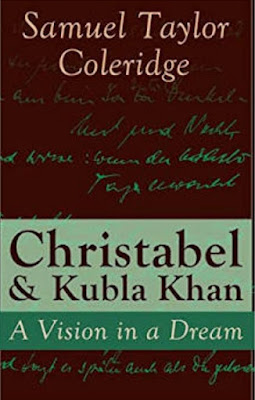Christabel: Kubla Khan, a Vision; The Pains of Sleep Poem
by Samuel Taylor Coleridge
Kubla Khan (/ˌkʊblə ˈkɑːn/) is a poem written by Samuel Taylor Coleridge, completed in 1797 and published in 1816. It is sometimes given the subtitles "A Vision in a Dream" and "A Fragment." According to Coleridge's preface to Kubla Khan, the poem was composed one night after he experienced an opium-influenced dream after reading a work describing Shangdu, the summer capital of the Yuan dynasty founded by the Mongol Emperor Kublai Khan. Upon waking, he set about writing lines of poetry that came to him from the dream until he was interrupted by "a person from Porlock". The poem could not be completed according to its original 200–300 line plan as the interruption caused him to forget the lines. He left it unpublished and kept it for private readings for his friends until 1816 when, at the prompting of Lord Byron, it was published. Wikipedia
About the Author
Samuel Taylor Coleridge (/ˈkoʊlərɪdʒ/;[1] 21 October 1772 – 25 July 1834) was an English poet, literary critic, philosopher, and theologian who, with his friend William Wordsworth, was a founder of the Romantic Movement in England and a member of the Lake Poets. He also shared volumes and collaborated with Charles Lamb, Robert Southey, and Charles Lloyd. He wrote the poems The Rime of the Ancient Mariner and Kubla Khan, as well as the major prose work Biographia Literaria. His critical work, especially on William Shakespeare, was highly influential, and he helped introduce German idealist philosophy to English-speaking culture. Coleridge coined many familiar words and phrases, including "suspension of disbelief". He had a major influence on Ralph Waldo Emerson and American transcendentalism. Wikipedia
Buy Samuel Taylor Coleridge Books at Amazon
The PDF might take a minute to load. Or, click to download PDF.
If your Web browser is not configured to display PDF files. No worries, just click here to download the PDF file.



.jpg)
No comments:
Post a Comment